How Indian billionaire Gautam Adani lost half his fortune in a flash, triggering political fallout
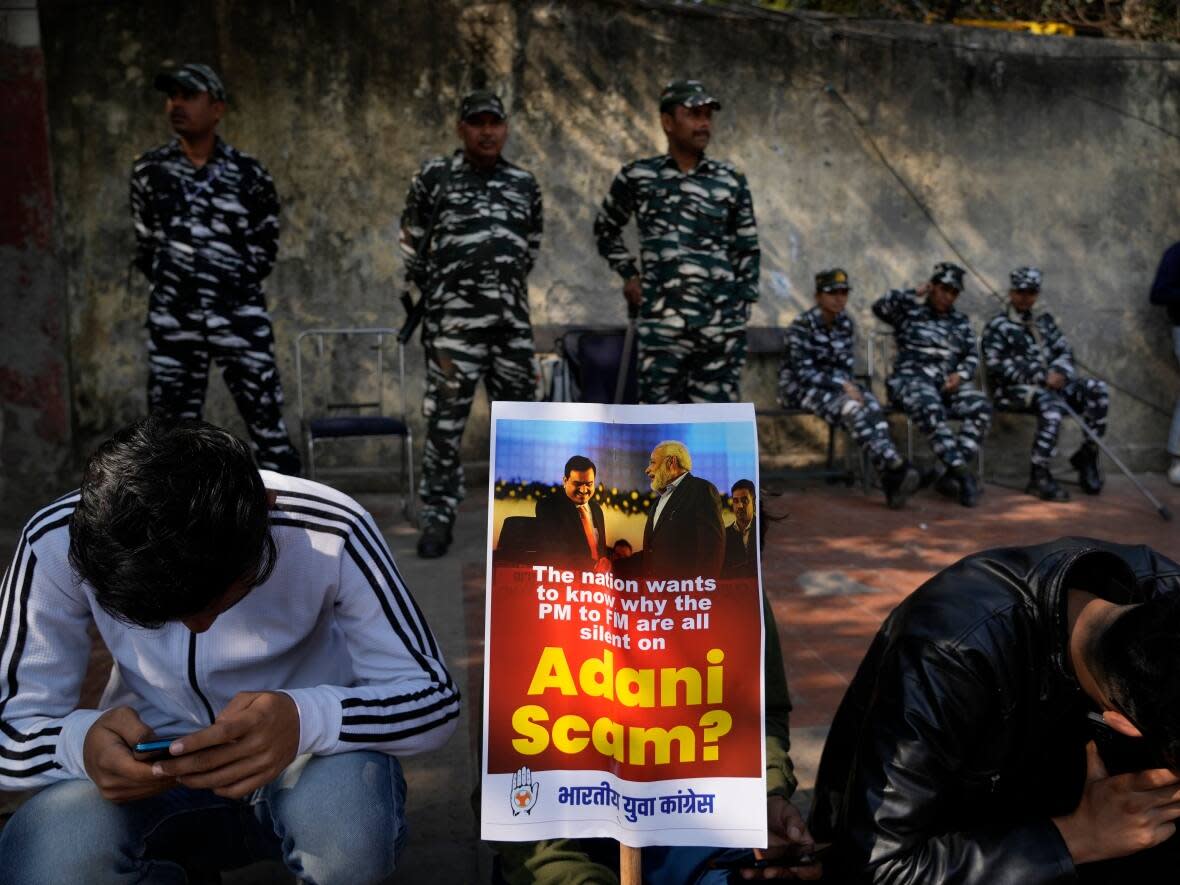
In the span of just 10 dramatic days, Gautam Adani — a self-made Indian billionaire with a sprawling empire that made him the third-richest person in the world — saw more than half of his fortune vanish.
His Adani Group lost more than $110 billion US in market value as investors jumped ship, and the 60-year-old tycoon's personal fortune also plunged by roughly half, dropping him from his perch in the Top 3 of Forbes's list of billionaires.
The reason? A small U.S. short-seller firm called Hindenburg Research accused the Adani Group of fraud and stock manipulation, triggering the market rout and forcing the company to abandon a $2.5-billion share offering.
The Adani Group has vehemently denied the allegations, but the crisis engulfing India's second-largest conglomerate keeps deepening — both economically and politically.
Here are some key takeaways from the fallout:
What are the allegations against the Adani Group?
In late January, New York-based Hindenburg Research took investors by surprise and dropped a scathing report accusing the Adani Group of "brazen" accounting fraud and stock manipulation, deeming it "the largest con in corporate history."
The report levelled 88 questions at the Indian conglomerate, asking about the group's debt levels, accusing it of using known tax havens, and claiming the ultimate goal was to inflate the market value of Adani's listed companies.
The short-seller firm stands to gain from the subsequent fallout, having taken short positions — or bets that the stocks will fall — on some internationally traded Adani bonds and derivatives.
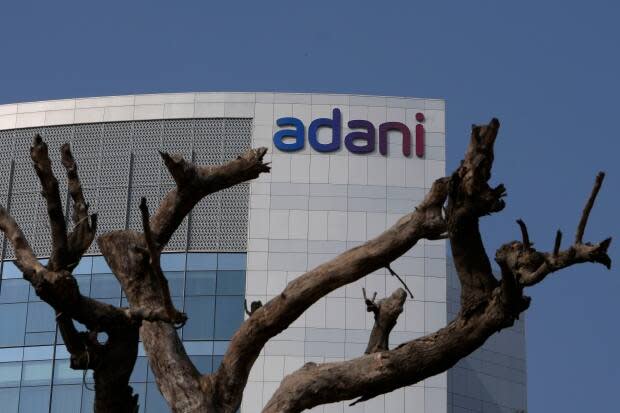
Executives at Adani Group fired back, denying the allegations and publishing a detailed, 413-page rebuttal. They called the report "nothing but a lie" and a "calculated attack on India" itself.
"The Group has always been in compliance with all laws, regardless of jurisdiction, and maintains the highest standards of corporate governance," chief financial officer Jugeshinder Singh said in a video published Jan. 25 on YouTube.
"I don't think anyone expected such a spectacular collapse in the [Adani] share price," said Hemindra Hazari, a Mumbai-based independent market analyst.
"But everybody in the market knew that the huge growth in valuation was something which was unnatural."
The Adani Group's stock had surged in value by 2,500 per cent over the last five years — a gain that Adani has often equated with India's rapid economic growth, intertwining his success story with that of his nation.
Who is Gautam Adani?
Before these latest troubles, Adani was listed as the world's third wealthiest person by Forbes, with a personal net worth of $120 billion US. After losing about half of that, he's barely cracking the Top 20.
A university dropout and first-generation entrepreneur, Adani founded his company some 35 years ago and first built his fortune in trading and coal mining, before branching into construction, power generation, the operation of ports and airports, manufacturing defence equipment and running a media company.
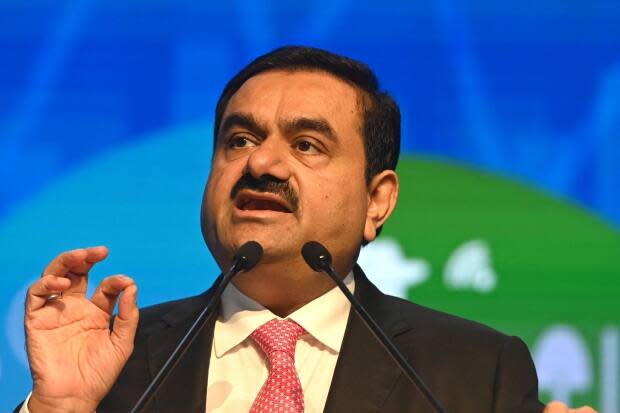
The Adani Group — a conglomerate of seven publicly traded companies — includes among its holdings India's largest national portfolio of renewable energy assets and seven of the country's airports, including Mumbai International.
Critics say the billionaire tycoon has also benefited from a close relationship with India's prime minister, Narendra Modi, who, like Adani, hails from the western Indian state of Gujarat.
How have the markets reacted?
Investors were alarmed when the U.S. report came out and immediately started offloading shares, as the company's fortunes unravelled.
"The markets have gone with the Hindenburg report and the clarifications from the Adani Group have not assuaged investors' fears," Hazari said, pointing to the fact that the company's bonds were trading at 70 cents to the dollar — "bankruptcy and junk bond valuations," according to the analyst.
"The foreign investors interested in debt have shown what they think of the company."
While Adani shares collapsed, the Nifty 50, the benchmark index of India's National Stock Exchange, only dipped by one per cent — a sign for Hazari that "the markets do not see this as an Indian problem," but rather "an Adani problem."
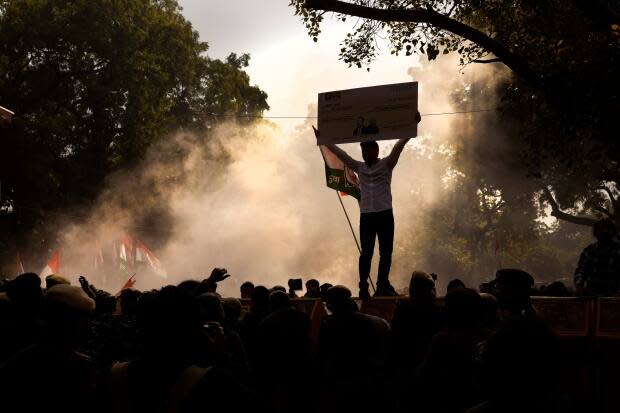
India's markets regulator, SEBI, did little to calm nerves, simply stating, without specifically referring to the Adani Group, that the regulator is committed to making sure the stock market functions in a "transparent, efficient manner."
That tepid statement is an issue for Amarjit Chopra, a former president of the Institute of Chartered Accountants of India.
"I'm a bit disappointed," he told CBC News. "The market regulator should be looking at where the funds are coming from."
WATCH | Protesters, opposition parties calling for probe into India's Adani Group:
Hazari echoed that sentiment, saying that when the company involved is seen as too close to the governing party, then it's the regulator's duty to speak out.
"If the regulator is not seen to be going public or doing anything, it brings about a major concern for the entire market," he said.
The allegations swirling around the company and its founder's ties to the government may have a wider effect, though, Hazari suggested.
"Creditors will also… now be especially cautious when certain corporate groups are perceived to be close to the ruling establishment."
What's the political fallout?
Hundreds of members of opposition parties are also concerned, taking to the streets in rowdy protests to demand a full investigation into the allegations against the Adani Group.
Some protesters scaled police barricades and were detained, while others burned suitcases plastered with images of Adani and Modi.
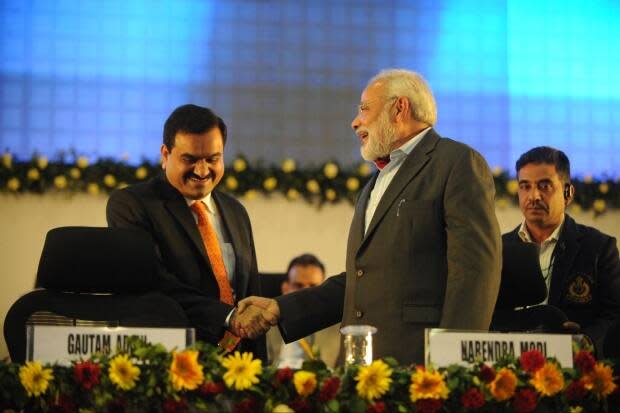
Earlier this month, Indian MPs disrupted the parliamentary session in both houses of Parliament over several days to bring attention to the allegations against the Adani Group.
"There was no talk of an inquiry," the leader of the opposition Congress Party, Rahul Gandhi, told reporters. "It is clear that the prime minister is protecting [Adani]."
Modi's ruling Bharatiya Janata Party dismissed the statements, calling them "wild allegations."
What happens next?
The abrupt and dramatic dip in stock prices is raising questions of whether the Adani Group's companies can cover their costs going forward, with their large debt load.
After the conglomerate announced it would pay back $1.1 billion US in loans ahead of schedule, in a bid to calm investors, Adani's stock rebounded somewhat this week. The loans weren't due until September 2024, and included shares in Adani's ports business.
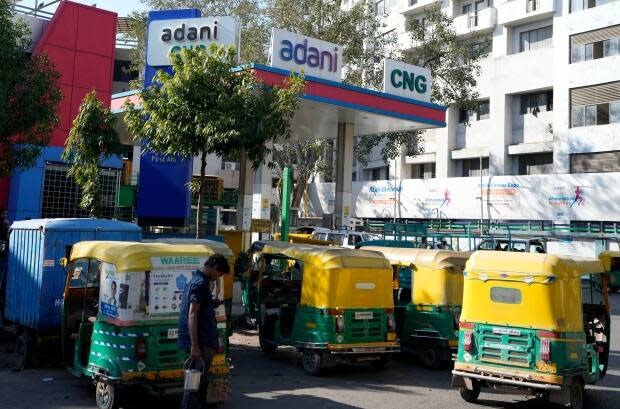
"Confidence will definitely be shaken, there's no doubt about it," said Chopra. But he doesn't believe India's economy will be affected long term.
"It's not [the case] that India is Adani and Adani is India," he said. "India is much bigger."
Chopra further believes the economic uncertainty will be short-lived because of the types of investments and infrastructure projects the Adani Group controls — valuable, stable assets, including various ports and cement plants.
"Will people shun the Adanis? No, that's not going to happen."


